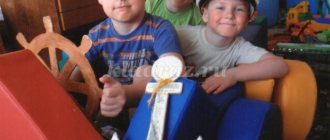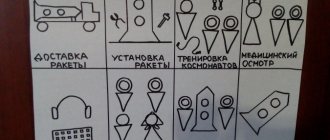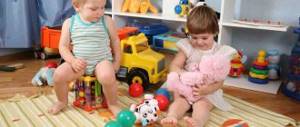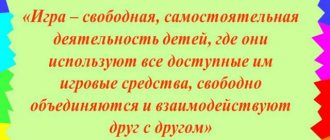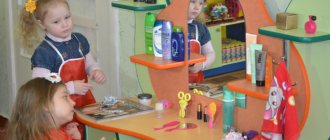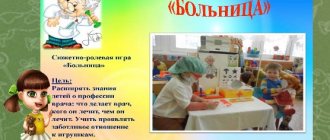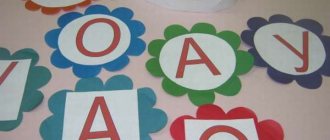Bunina DilyaMuzamirovna, Korbashova Olga Valeoevna, educators of MADOU D/s No. 11 of the urban district of the city of Ufa of the Republic of Bashkortostan. A message from work experience, in a senior group, on organizing the role-playing game “Travel Agency”. Goal: to expand the range of children's role-playing games to develop diverse interests and abilities in children of senior preschool age; introduce modern reality through a new role-playing game.
A message from work experience in organizing the role-playing game “Travel Agency”
Preschool childhood is the most important period of personality development. During these years, the child acquires initial knowledge about the life around him, he begins to form a certain attitude towards people, towards work, develops skills and habits of correct behavior, and develops a character. It is from preschool age that it is necessary to introduce modern technologies in the educational process, which open up good opportunities for the successful development of preschoolers.
Over the past 10 years in the Russian Federation, increasing attention has been paid to improving financial literacy as the most important factor in the country’s economic development.
Considering the penetration of economics into all spheres of people’s lives, it is very important to give children a basic economic education for the financial well-being of preschoolers when they become adults. Indeed, from early childhood, children, together with their parents, go to banks, shops, see promotions at which one product can be purchased at a lower cost, know what plastic cards are, participate in the purchase and sale of goods, thus mastering primary economic knowledge.
How can we, adults, help preschoolers gain useful information about the science of economics, develop their economic thinking, speech, and imagination? Of course, during the game, because in preschool age it is the leading activity and is of great importance for the education and development of the individual. A special place in the activities of preschoolers is occupied by role-playing games, in which children reproduce in roles everything that they see around them in the life and activities of adults.
Using role-playing games to teach children the basics of economics, we, in an accessible form, allow them to form primary ideas, consolidate, generalize and systematize them.
Taking into account all of the above, we also decided to organize a role-playing game with economic content for children. If in younger groups children enjoyed playing in a store, a hairdresser, or a hospital, then as the children grew, it became necessary to choose a game that was more complex in content. We chose the role-playing game “Travel Agency” not by chance. Nowadays, it is possible to travel to different destinations, including the territory of your city, as well as trips to foreign countries.
In the summer, children spent their holidays with their parents, brought photographs, told where they had been and what they remembered. The guys looked at the photos and souvenirs with great interest and talked about this topic. This is how the idea of creating this game was born.
We really wanted to reflect the regional component in the game, so we decided to name the travel agency “ALGA”, which means “forward” in Bashkir.
Since one of the main objectives of the game was to promote the formation of basic economic knowledge, the concept of commodity-money relations, that every profession requires a responsible, serious approach to business, we first of all produced: an ATM, a non-cash payment terminal, contract forms , bank checks, dummies of passports, money, travel vouchers, and signs have been prepared. The parents of the students also provided considerable assistance, providing photographs of their children on vacation - abroad, at resorts in the Krasnodar Territory, and simply on walks through memorable places in Ufa. Thanks to these photographs, we were able to produce albums in the form of advertising brochures for the game (“Excursion to Ufa”, “Sea Voyage”) with elements of individualization of the educational process (photos of the group’s students on vacation are placed on each of the advertising pages). The guys look at these albums with pleasure and talk about where they have been.
Parents also provided various attributes for the game: phones, cameras, badges, a laptop, children's stamps, souvenirs, magnets, plane and train tickets, advertising brochures and much more.
It was decided to start the work of the travel agency with the immediate environment of the children - with a tour of Ufa. If foreign countries were not familiar to all children, then their hometown is something that is close and understandable. For this purpose, the parents and kindergarten teachers made models of Ufa attractions - the Telecenter, a monument to the national hero of the Bashkir people Salavat Yulaev, a recreation park named after S.T. Aksakov, Suspension Bridge, “Seven Girls” fountain, “Lala-Tulpan” mosque and others. The guys, acting as tour guides, happily told the “tourists” about familiar sights.
We did a lot of preliminary work in preparation for the game:
- educational conversations with children on the topic “Tour of hometown”, “Sights of Ufa”, “Why do people travel”, “Let’s talk about professions”, “Exchange and money”, “Family economics”, “Mom and I are going to the store”, “Where does the money come from?”
- Getting to know the professions of the tourism business, looking at illustrations, photographs of the sights of your hometown.
- Didactic games: “Experts of Ufa”, “Travel to the Native Land”, “Loto “Ufa””.
This work included the integration of all educational areas:
— cognitive development (conversations on the topic of HRE, looking at pictures);
- social and communicative (cultivating a caring attitude towards game attributes, developing the ability to yield to comrades, play together);
— speech development (the ability to conduct a dialogue, compiling short stories from pictures, developing the ability to answer the teacher’s questions, enriching the vocabulary on the topic of SRI);
- artistic and aesthetic (making attributes, memorizing poems, listening to songs, drawing on the theme of HRE).
In conclusion, I would like to note that the work carried out contributed to:
— consolidating children’s knowledge about tourism business professions, developing the ability to perform the roles of tourism manager, tour operator, cashier, tourist, guide;
- developing the ability to conduct role-playing dialogue in accordance with the game plan;
- the formation of basic economic knowledge, the concept of commodity-money relations, the fact that every profession requires a responsible, serious approach to business;
- fostering a respectful and friendly attitude towards people of various professions, the ability to take into account the wishes of comrades, and treat attributes with care.
Summary of the role-playing game “Travel Agency” (plot: excursion around one’s hometown), in the senior group.
Goal : to expand the range of children's role-playing games to develop diverse interests and abilities in children of senior preschool age; introduce modern reality through a new role-playing game.
Tasks:
- develop the ability to determine the theme of the game, distribute roles, prepare the necessary conditions, select attributes, agree on the sequence of joint actions;
— consolidate children’s knowledge about tourism business professions. To develop the ability to perform the roles of tourism manager, tour operator, cashier, tourist, guide;
-improve the ability to conduct role-playing dialogue in accordance with the game plan;
- encourage children to more widely and creatively use knowledge about their hometown in the game;
- contribute to the formation of basic economic knowledge, the concept of commodity-money relations, the fact that every profession requires a responsible, serious approach to business;
- fostering a respectful and friendly attitude towards people of various professions, the ability to take into account the wishes of comrades, and treat attributes with care.
Preliminary work :
- educational conversations with children on the topic “Tour of hometown”, “Sights of Ufa”, “Why do people travel”, “Let’s talk about professions”, “Exchange and money”, “Family economics”, “Mom and I are going to the store”, “Where does the money come from?”
- Getting to know the professions of the tourism business, looking at illustrations, photographs of the sights of your hometown.
- Didactic games: “Experts of Ufa”, “Travel to the Native Land”, “Loto “Ufa””.
- Production and search of attributes: tickets, passports, money, badges and decals for travel agency employees, tablet, ATM, payment terminal on the bus, souvenirs, cameras, models of Ufa attractions.
Equipment and materials:
Tables, chairs, model of a bus, models of attractions, laptop, telephone, terminal, ATM, cash register, cameras, passports, stamps, vouchers, advertising brochures, money, bank cards, tickets, bank checks, travel agency name sign, bags, backpacks, suitcase, steering wheel, souvenirs (magnets, postcards), national dishes (chak-chak, honey, kumiss, vak-belyashi), distinctive signs for travel agency employees (ties, badges).
Organizing time:
The teacher shows the children a suitcase and asks them to tell them for what purposes people use this item.
Children: people pack their things in a suitcase when they go on a trip.
Educator: Guys, maybe we can go on a trip too?
Children: yes, let's go!
Educator: What do you need to do to go on a trip?
Children: to go on a trip you need to pack your things and buy a ticket.
Educator: where can we buy a ticket?
Children: at a travel agency!
Educator: Let's open our own travel agency! (Come on!) What does it take?
(Children and the teacher build an action plan: assign roles (director, tourism manager, tour operator, cashier, tourists), announce the opening (name, sign, advertising), customer service).
I propose to call our travel agency “Alga”, which means forward, and also to distribute the roles.
And now I ask the agency employees to go to their workplaces and prepare them for work, and for tourist travelers to prepare for visiting the agency. (Each child, according to his role, selects attributes for himself).
Progress of the game:
The agency director (educator) addresses the employees: - Dear employees, colleagues. Today we are opening our agency "Alga". There will be many clients. I urge all employees to be polite to clients, provide them with the necessary assistance and advice.
Manager: Hello! Travel agency "Alga" welcomes you!
Clients: Hello!
Manager: How can we help you?
Clients: My friends and I would like to go somewhere and have fun.
Manager: have you already chosen a route, or would you like to get acquainted with our offers?
Clients: We haven’t decided yet, but what can you offer?
Manager: Today we can offer you a very interesting tour of our hometown Ufa. Our guides will introduce you to the sights of the city. You will visit the garden of culture and recreation named after S.T. Aksakov, visit the “Seven Girls” fountain, the “Lala-Tulpan” mosque, walk along the suspension bridge in the park named after Salavat Yulaev, see the monument to the national hero of the Bashkir people Salavat Yulaev, and also see the openwork television tower, the height of which is 192 meters.
Clients: Great, we are satisfied with your offer!
Manager: Then give us your passports and draw up the agreement. (Design)
Here are your vouchers, please go to the ticket office and pay. Have a nice holiday!
Cashier: Hello! Show us the contract, that’s right, you’ll pay 2,500 rubles for 5 people. Unfortunately, we only pay in cash, if you only have a card, you can go to an ATM and withdraw money.
Clients: Okay, thank you! (Go to the ATM, withdraw money and pay for the tour at the ticket office).
Cashier: Please go to the bus, the guides are already waiting for you there. All the best!
Customers board the bus, where the conductor checks for tickets.
They are going on an excursion.
The bus follows the specified route, stopping at attractions, guides tell tourists about the monuments, tourists take photographs. At the end of the excursion, the guides offer to go to the souvenir shop to purchase souvenirs.
Clients thank the guides for an interesting and educational excursion.
APPLICATION
Summary of the role-playing game “Travel to Sochi”
MBDOU kindergarten for supervision and health care No. 44, Angarsk, Irkutsk region
Educator
Link to the article, when indicated in the bibliography (according to GOST R 7.0.5–2008):
Novoselova N.V. Synopsis of the role-playing game “Travel to Sochi” // Sovushka. 2020. No. 2. URL: https://kssovushka.ru/e-sovushka.2016.n2-a/VP16030012.html (access date: 10.10.2020).
Goal: Creating conditions for active creative play activities.
Tasks:
Educational: Cultivate goodwill between children, the ability to take into account the wishes of comrades. Educational:
- Develop independence in creating a gaming environment, in observing the rules and norms of behavior in the game
- encourage children to more widely and creatively use in games the knowledge gained from familiarization with the surrounding reality.
- promote a conscious attitude towards compliance with the rules of role interaction, directing attention to the quality of the roles performed and their social significance.
Developmental: Develop initiative, organizational and creative abilities of children. Integration: “Health”, “Communication”, “Socialization”, “Cognition”, “Music”. Equipment: World map, sign “Cashier” and “Air tickets”, money, sign for the bus “Angarsk-Airport”, steering wheel for the driver, caps and scarves for flight attendants, caps for pilots, numbers for seats on the plane, steering wheel of the plane, control panel , walkie-talkie, compass, tables, cafe dishes, food, pictures depicting Olympic venues, badges for guides, TV, souvenir stall with Olympic paraphernalia, cups of water on the plane, seat belts on the plane, Sochi sign. Musical accompaniment; Recording the takeoff and landing of an airplane. video about the Olympics, calm music. Methods of organization: - organize a place for play that corresponds to the age and number of children playing on it. - think over the selection of toys, materials, manuals and monitor their updating in accordance with the needs of educational gameplay and the general development of children. - guiding the observations of children, helping to display the positive aspects of social and work life in the game. Methodological techniques: 1. Indirect - without direct intervention in the game (bringing in toys, creating a play environment before the start of the game)
- Enriching children's social experience through observations and watching television. Conversations.
- Involving children in making attributes and designing the playing field.
- Replenishment and enrichment of the gaming environment in accordance with the knowledge acquired in the classroom.
2. Direct: Direct involvement of the teacher in the game, taking on a secondary role.
- Participation in the conspiracy of children.
- Help in solving game problems, maintaining cognitive interest in the game.
- Observing children's play.
- Directing children’s plans and actions (advice, hint, question)
- Collective discussion of children's role behavior after the game.
Preliminary work: - Conversations about the Olympic movement. Symbolism, sports. Conversations about the professions of pilots, flight attendants, and Black Sea workers. There I would invite you to see the sights of the Olympic venues. How can you overcome this long distance? Children: on a plane. Educator: Then we need to rush to the box office to get tickets. (The teacher and children buy air tickets at the ticket office) Teacher: Now we are going to the airport, we need to hurry, otherwise we will be late for our flight. They make a bus out of the benches, select a driver, and go to the airport. Bus "Angarsk-Airport" While they are on the bus, a speech game is being played. We are sitting on the bus And we look out the window (clap our hands on our knees) We look cheerfully (turn our heads to the right and left) And the engine growls, growls Roar-ry-ry-ry At whom then he grumbles Ry-ry-ry The car rushes forward Sh-sh-sh The teacher and the children go to the plane. Flight attendant child: Boarding for the Angarsk-Sochi flight is announced, I ask everyone to board the plane (tickets are checked and seats are named). Take all your seats and get ready for the plane to take off. Fasten your seat belts. (Pilots start engines and music plays.) 3. Flight attendant child: Don’t worry, the takeoff went well and now we are gaining altitude, after a while you will be provided with soft drinks, coffee, a driver, and a tour guide. -watching TV shows about the Olympics and sports. Athletes. Symbolism, talismans. Plan:
- The introductory part is creating a game situation and preparing for the game.
- Journey.
- The result of the game.
Literature:
- Kolunova L.A. , Kopitina M.G. Organization of gaming activities in a preschool educational institution. M.: Publishing house Rost. region IPK and PRO, 1997.
- Mironova R.M. Game in the development of active activity of children. Minsk, 1989.
- Role-playing games for preschoolers / N.A. Boychenko, P.I. Grigorenko, E.I. Kovalenko, E.I. Shcherbakova. Kyiv, 1982.
- Elkonin D.B. Psychology of the game. M.: Center, 1999.
- Krasnoshchekova N.V. Role-playing games for preschool children. M.: School of Development, 2007.
Progress of the game:
Educator: Guys, I suggest you go on a trip. Where would you like to go? Children: Answers. Educator: And I propose to go to Sochi, where the Olympic Games were held. But it's very far away. (Look at the map). Sochi is a southern city of Russia on the eastern coast. (water is handed out in cups at the distribution stations). I suggest you watch a short but interesting video about our athletes and sports. (The TV turns on with a sports video). I. Flight attendant: Get ready, we are about to land. Please do not walk around the plane, take your seats and fasten your seat belts... (The hum of the plane stops). II . Stewardess: The landing was successful, please leave. Please do not be late for your return flight. (Guests are met near the plane by two tour guides). Guide: Attention, I ask the tourist group from the city of Angarsk to go to the guide Danil. Children: They pass by and say hello. Tour guide: You are probably hungry and tired, we have a cafe nearby, you can go in and have a snack. (He takes the children to a cafe, the children independently distribute the roles of waiters, place orders, listen to calm music in the cafe, and relax). Guide: Have you rested yet?, then we can start our tour of Olympic Sochi, to the Olympic venues. (Children go to the group where pictures depicting Olympic objects are hung.) Guide: You know that the Winter Olympic Games were held in Sochi from 02/07-23/14. The symbol is 5 rings fastened together. Blue - Europe, black - Africa, red - America, yellow - Asia, green - Australia. The Olympic Games were held in Russia for the second time; before that, there were 22 summer games in Moscow and the winter games for the first time. The basis of the image was the principles of a patchwork quilt - these are ornaments of the national crafts of Russia.
- Look, this is the Sochi star emblem made of white and blue lines against the background of the blue sky and mountain peaks. Blue is the color of the sea, the sky, white is the color of snow, red is the color of victory.
- And this is the Olympic mascot, a polar bear, a bunny, a leopard.
- This is a skating center with 8000 spectators.
- Small Ice Arena - hockey competitions were held.
And this is an ice palace for figure skating and short track speed skating.
- The curling arena is a sports game on an ice track, teams take turns throwing heavy granite stones along the ice towards the target.
- Olympic Stadium for 40,000 spectators.
- Large ice hockey arena for 12,000 spectators
Guide: Our tour has come to an end. We hope that you liked the Olympic village and that you will all come to us again. Go to the kiosk where you can buy souvenirs of the Sochi Olympics. (Children go to the kiosk and buy souvenirs). Educator: It’s time for us to return home, let’s go to the plane. Who is waiting for us at the airport. We thank the guides for the interesting story. The children take their seats on the plane, the pilots start the engine, the flight attendant asks to fasten their seat belts, the children return home.
